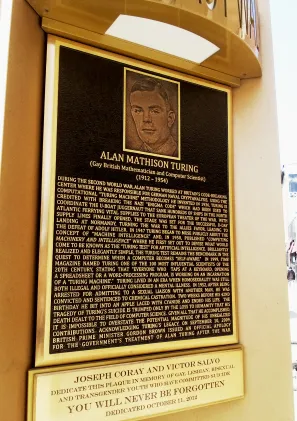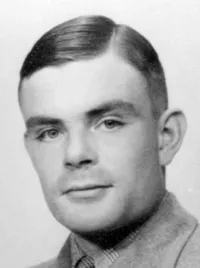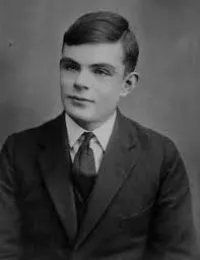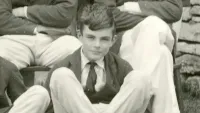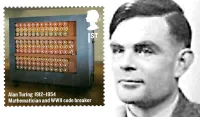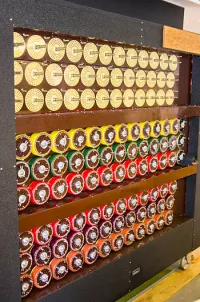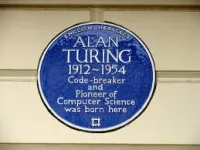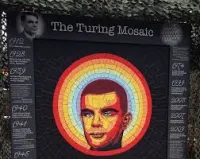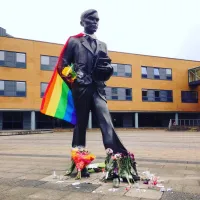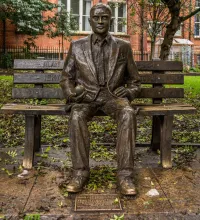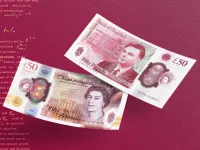Plaque Sponsor
Joseph Coray and Victor Salvo in memory of gay, lesbian, bisexual and transgender youth who have committed suicideBiography
1912 - 1954
“Sometimes it is the people who no one imagines anything of
who do the things that no one can imagine.”
- Alan Turing
During the Second World War, Alan Turing worked at Britain's code-breaking center where he was responsible for German naval cryptanalysis. Using the computational “Turing Machine” methodology he invented in 1936, Turing is credited with breaking the Nazi “Enigma Code” which had been used to coordinate the U-boat juggernaut that sank hundreds of ships in the North Atlantic ferrying vital supplies to the European theater of the war. With supply lines finally opened, the stage was set for the successful D-Day landing at Normandy, turning the war to the Allies favor, leading to the defeat of Adolf Hitler. In 1947 Turing began to muse publicly about the concept of “machine intelligence” and, in 1950, published “Computing Machinery and Intelligence” where he first set out to devise what would come to be known as the “Turing Test” for Artificial Intelligence. Brilliantly realized and elegantly simple, the Turing Test remains the benchmark in the quest to determine when a computer becomes “self-aware.” In 1999, TIME magazine named Turing one of the 100 most influential scientists of the 20th century, stating that "everyone who taps at a keyboard, opening a spreadsheet or a word-processing program, is working on an incarnation of a ‘Turing Machine’." Turing lived in an era when homosexuality was still both illegal and officially considered a mental illness. In 1952, after being arrested for admitting to a sexual liaison with another man, he was convicted and sentenced to chemical castration. Two weeks before his 42nd birthday he bit into an apple laced with cyanide and ended his life. The tragedy of Turing’s suicide is trumped only by the loss to humanity that his death dealt to the field of Computer Science. Given all that he accomplished, it is impossible to overstate the potential magnitude of his unrealized contributions. Acknowledging Turing’s legacy, on September 10, 2009, British Prime Minister Gordon Brown issued an official apology for the government’s treatment of Alan Turing after the war. He was officially pardoned by Queen Elizabeth in December 2013.
EDITOR'S NOTES: Turing's pardon prompted a nationwide movement to reverse the convictions of everyone whose life was shattered by Britain "Gross Indecency" law. In 2016, "The Alan Turing Law" was passed by the British Parliament, exonerating all those imprisoned under the antiquated statute. Considered a national hero today, Alan Turing's likeness now graces England’s ₤50 note.
VIEW ENLARGED TURING MEMORIAL
1912 - 1954
“Sometimes it is the people who no one imagines anything of
who do the things that no one can imagine.”
- Alan Turing
During the Second World War, Alan Turing worked at Britain's code-breaking center where he was responsible for German naval cryptanalysis. Using the computational “Turing Machine” methodology he invented in 1936, Turing is credited with breaking the Nazi “Enigma Code” which had been used to coordinate the U-boat juggernaut that sank hundreds of ships in the North Atlantic ferrying vital supplies to the European theater of the war. With supply lines finally opened, the stage was set for the successful D-Day landing at Normandy, turning the war to the Allies favor, leading to the defeat of Adolf Hitler. In 1947 Turing began to muse publicly about the concept of “machine intelligence” and, in 1950, published “Computing Machinery and Intelligence” where he first set out to devise what would come to be known as the “Turing Test” for Artificial Intelligence. Brilliantly realized and elegantly simple, the Turing Test remains the benchmark in the quest to determine when a computer becomes “self-aware.” In 1999, TIME magazine named Turing one of the 100 most influential scientists of the 20th century, stating that "everyone who taps at a keyboard, opening a spreadsheet or a word-processing program, is working on an incarnation of a ‘Turing Machine’." Turing lived in an era when homosexuality was still both illegal and officially considered a mental illness. In 1952, after being arrested for admitting to a sexual liaison with another man, he was convicted and sentenced to chemical castration. Two weeks before his 42nd birthday he bit into an apple laced with cyanide and ended his life. The tragedy of Turing’s suicide is trumped only by the loss to humanity that his death dealt to the field of Computer Science. Given all that he accomplished, it is impossible to overstate the potential magnitude of his unrealized contributions. Acknowledging Turing’s legacy, on September 10, 2009, British Prime Minister Gordon Brown issued an official apology for the government’s treatment of Alan Turing after the war. He was officially pardoned by Queen Elizabeth in December 2013.
EDITOR'S NOTES: Turing's pardon prompted a nationwide movement to reverse the convictions of everyone whose life was shattered by Britain "Gross Indecency" law. In 2016, "The Alan Turing Law" was passed by the British Parliament, exonerating all those imprisoned under the antiquated statute. Considered a national hero today, Alan Turing's likeness now graces England’s ₤50 note.
VIEW ENLARGED TURING MEMORIAL
Lesson Plan
Please login or register for an account to view this lesson plan.
Demography
Demography
Gender Male
Sexual Orientation Gay
Gender Identity Cisgender
Ethnicity Caucasian/White
Nations Affiliated United Kingdom
Era/Epoch World War II (1939-1945)
Field(s) of Contribution
Computer Science
Inventor
Mathematics
Military
Science
Social Sciences
STEM & Medicine
World History
Commemorations & Honors
Appointed Officer of the British Empire (1946)
Elected a Royal Society Fellow (1951)
Association for Computing Machinery Annual Turing Award (1966)
Stretch of the A6010 Road in Manchester Renamed Alan Turing Way (1994)
English Heritage Blue Plaque Unveiled at his Birthplace in London (1998)
Time Magazine Named Turing one of the 100 Most Important People of the 20th Century (1999)
Alan Turing Statue Unveiled in Manchester's Sackville Park (2001)
Alan Turing's Bletchley Park Work Named an IEEE Milestone (2003)
Alan Turing Statue by John W. Mills Unveilved at University of Surrey in Guildford (2004)
Commemorative British Stamp (2012)
Google Doodle Commemorating Turing's 100th Birthday (2012)
Posthumous Royal Pardon by Queen Elizabeth II (2013)
Inaugural San Francisco Rainbow Honor Walk Honoree (2014)
Bletchley Public Art Installation Unveilved Alongside Watling Street (2014)
United States National Security Agency Hall of Honor Inductee (2014)
Alan Turing Institute Named After Him (2015)
Turing's Portrait Bank of England 50 Pound Note (2021)
Demography
Gender Male
Sexual Orientation Gay
Gender Identity Cisgender
Ethnicity Caucasian/White
Nations Affiliated United Kingdom
Era/Epoch World War II (1939-1945)
Field(s) of Contribution
Computer Science
Inventor
Mathematics
Military
Science
Social Sciences
STEM & Medicine
World History
Commemorations & Honors
Appointed Officer of the British Empire (1946)
Elected a Royal Society Fellow (1951)
Association for Computing Machinery Annual Turing Award (1966)
Stretch of the A6010 Road in Manchester Renamed Alan Turing Way (1994)
English Heritage Blue Plaque Unveiled at his Birthplace in London (1998)
Time Magazine Named Turing one of the 100 Most Important People of the 20th Century (1999)
Alan Turing Statue Unveiled in Manchester's Sackville Park (2001)
Alan Turing's Bletchley Park Work Named an IEEE Milestone (2003)
Alan Turing Statue by John W. Mills Unveilved at University of Surrey in Guildford (2004)
Commemorative British Stamp (2012)
Google Doodle Commemorating Turing's 100th Birthday (2012)
Posthumous Royal Pardon by Queen Elizabeth II (2013)
Inaugural San Francisco Rainbow Honor Walk Honoree (2014)
Bletchley Public Art Installation Unveilved Alongside Watling Street (2014)
United States National Security Agency Hall of Honor Inductee (2014)
Alan Turing Institute Named After Him (2015)
Turing's Portrait Bank of England 50 Pound Note (2021)
Resources
Resources
Hodges, Andrew. Alan Turing: The Enigma. New York: Walker and Company, 1983.
Prager, John. On Turing. Belmont, Calif.: Wadsworth, 2001.
Turing, Alan Mathison. The Collected Works of A. M. Turing. P. N. Furbank, General Editor. London: North-Holland, 1992.
http://www.pinktriangle.org.uk/glh/234/turing1.html
http://news.bbc.co.uk/2/hi/8249792.stm
http://www.bbc.co.uk/news/science-environment-18561092
http://www.advocate.com/news/daily-news/2012/01/03/gay-wwii-codebreaker-be-celebrated-stamp
https://www.youtube.com/watch?v=ISI73dNbc0Q
https://www.cnn.com/2019/07/15/business/alan-turing-50-pound-note/index.html
https://www.nytimes.com/2019/06/05/obituaries/alan-turing-overlooked.html
https://www.pinknews.co.uk/2020/06/23/alan-turing-gay-who-was-did-eingma-die-death-facts/
https://www.biography.com/scientist/alan-turing
https://www.britannica.com/biography/Alan-Turing
https://www.advocate.com/world/2022/1/04/uk-extends-pardons-all-convicted-abolished-same-sex-crimes
Resources
Hodges, Andrew. Alan Turing: The Enigma. New York: Walker and Company, 1983.
Prager, John. On Turing. Belmont, Calif.: Wadsworth, 2001.
Turing, Alan Mathison. The Collected Works of A. M. Turing. P. N. Furbank, General Editor. London: North-Holland, 1992.
http://www.pinktriangle.org.uk/glh/234/turing1.html
http://news.bbc.co.uk/2/hi/8249792.stm
http://www.bbc.co.uk/news/science-environment-18561092
http://www.advocate.com/news/daily-news/2012/01/03/gay-wwii-codebreaker-be-celebrated-stamp
https://www.youtube.com/watch?v=ISI73dNbc0Q
https://www.cnn.com/2019/07/15/business/alan-turing-50-pound-note/index.html
https://www.nytimes.com/2019/06/05/obituaries/alan-turing-overlooked.html
https://www.pinknews.co.uk/2020/06/23/alan-turing-gay-who-was-did-eingma-die-death-facts/
https://www.biography.com/scientist/alan-turing
https://www.britannica.com/biography/Alan-Turing
https://www.advocate.com/world/2022/1/04/uk-extends-pardons-all-convicted-abolished-same-sex-crimes
